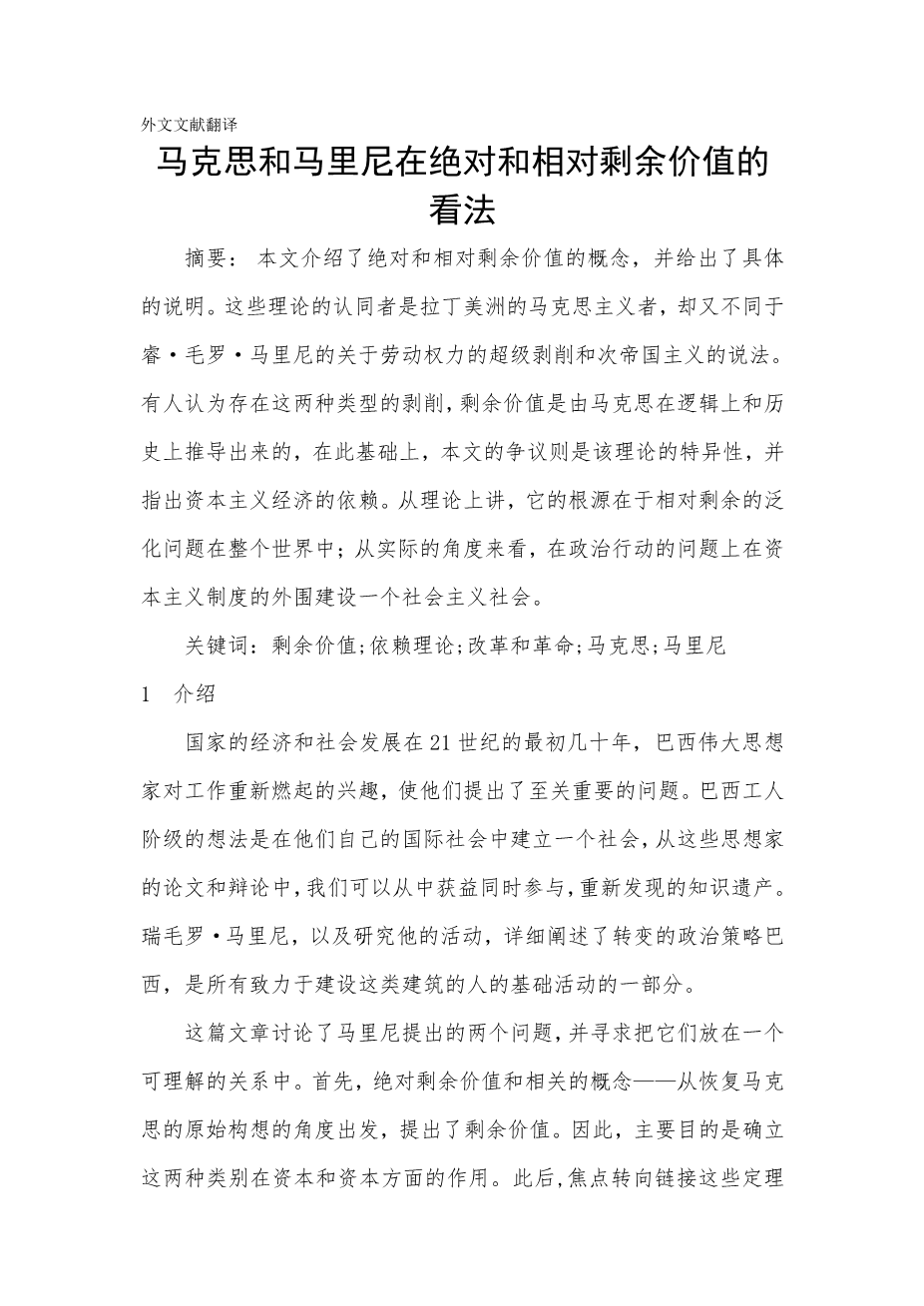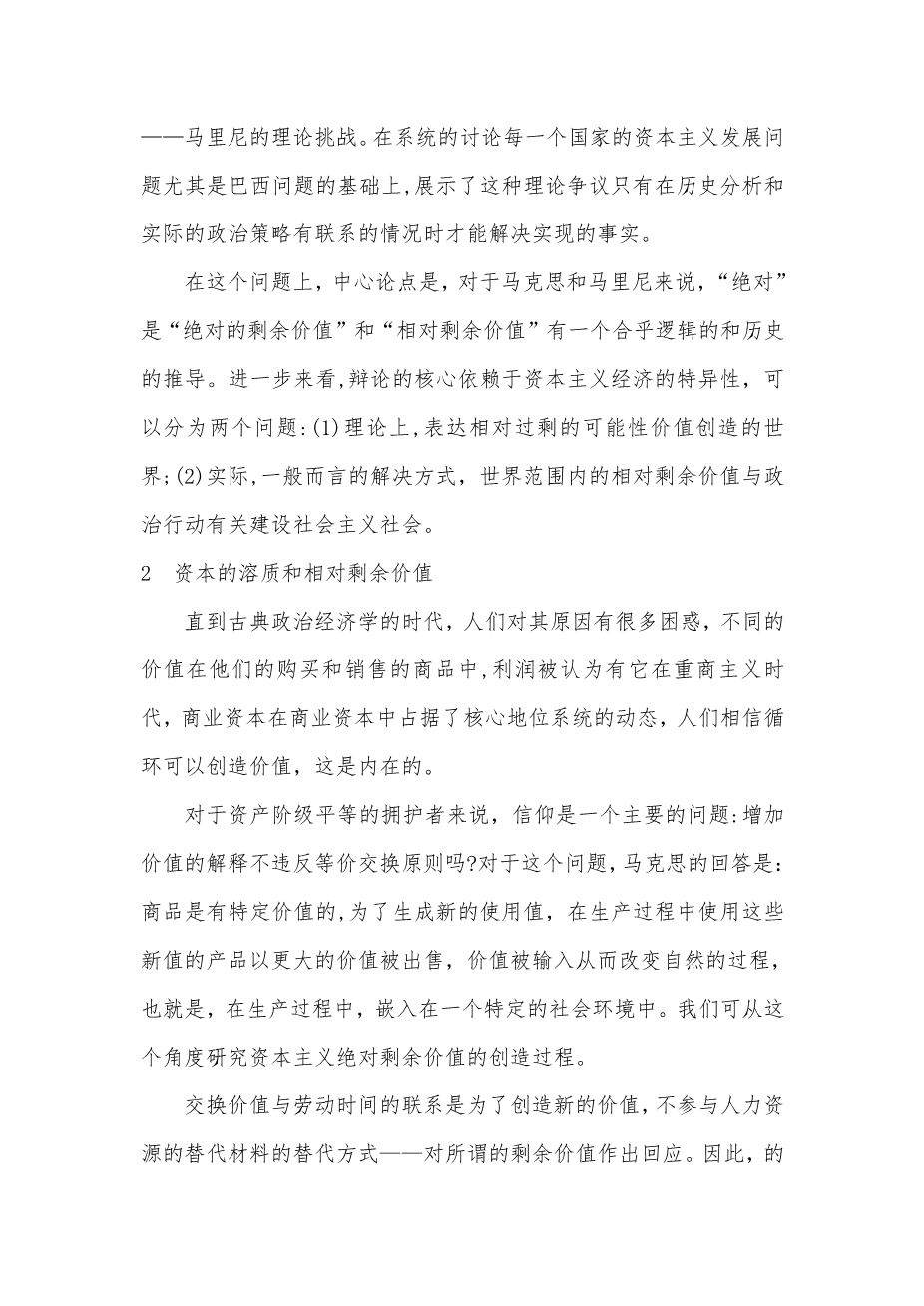This article was downloaded by: [Ryerson University]
Tiago Camarinha Lopes amp; Elizeu Serra de Araujo b
On: 16 June 2013, At: 05:01
Publisher: Routledge
Informa Ltd Registered in England and Wales Registered Number: 1072954 Registered
office: Mortimer House, 37-41 Mortimer Street, London W1T 3JH, UK
International Critical Thought
Publication details, including instructions for authors and
subscription information:
http://www.tandfonline.com/loi/rict20
Marx and Marini on Absolute and
Relative Surplus Value
a
a Instituto de Economia , Universidade Federal de Uberlacirc;ndia ,
Uberlacirc;ndia , Brazil
b Departamento de Economia , Universidade Federal do
Maranhatilde;o , Satilde;o Luiacute;s , Brazil
Published online: 14 Jun 2013.
To cite this article: Tiago Camarinha Lopes amp; Elizeu Serra de Araujo (2013): Marx and Marini on
Absolute and Relative Surplus Value, International Critical Thought, 3:2, 165-182
To link to this article: http://dx.doi.org/10.1080/21598282.2013.787272
PLEASE SCROLL DOWN FOR ARTICLE
Full terms and conditions of use: http://www.tandfonline.com/page/terms-and-
This article may be used for research, teaching, and private study purposes. Any
substantial or systematic reproduction, redistribution, reselling, loan, sub-licensing,
systematic supply, or distribution in any form to anyone is expressly forbidden.
The publisher does not give any warranty express or implied or make any representation
that the contents will be complete or accurate or up to date. The accuracy of any
instructions, formulae, and drug doses should be independently verified with primary
sources. The publisher shall not be liable for any loss, actions, claims, proceedings,
demand, or costs or damages whatsoever or howsoever caused arising directly or
indirectly in connection with or arising out of the use of this material.
International Critical Thought, 2013
Downloadedby[RyersonUniversity]at05:0116June2013
Vol. 3, No. 2, 165–182, http://dx.doi.org/10.1080/21598282.2013.787272
Marx and Marini on Absolute and Relative Surplus Value
Tiago Camarinha Lopesalowast; and Elizeu Serra de Araujob
a
Instituto de Economia, Universidade Federal de Uberlacirc;ndia, Uberlacirc;ndia, Brazil; bDepartamento de
Economia, Universidade Federal do Maranhatilde;o, Satilde;o Luacute;ıs, Brazil
The paper presents the concepts of absolute and relative surplus value with a view to specifying
how these categories are used by the Latin American Marxist, Ruy Mauro Marini in his theory
of labor power superexploitation and subimperialism. It is argued that both types of extraction
of surplus value are derived logically and historically by Marx. On this basis, the paper explains
the controversy concerning the specificity of the dependent capitalist economy by pointing out
that it has its roots, in theoretical terms, in the question of the generalization of relative surplus
value throughout the entire world, and in practical terms, in the issue of how political action can
construct a socialist society on the periphery of the capitalist system.
Keywords: surplus value; Dependency Theory; reform and revolution; Marx; Marini
1. Introduction
The renewed interest in the work of the great thinkers of Brazil poses crucial questions for the
countryrsquo;s economic and social development in the initial decades of the twenty-first century.
The idea of the Brazilian working class embracing a project to construct society in its own inter-
ests can certainly gain from recovering the theses and debates in which these thinkers were
involved. Rediscovering the intellectual legacy of the Brazilian social scientist Ruy Mauro
Marini, along with studying his activity in elaborating political strategies for the transformation
of Brazil, is part of this fundamental activity for all those committed to construction of this kind.1
This paper deals with two points that arise from the questions raised by Marini, and seeks to
place them in a comprehensible relationship. First, the concepts of absolute surplus value and rela-
tive surplus value are presented from the perspective of restoring Marxrsquo;s original formulation.
The primary objective is thus to establish the role of these two categories both in Capital and
in Marinirsquo;s thought. Thereafter, the focus shifts to the theoretical challenge of linking these theor-
etical categories with the question of capitalist development in the countries of the systemrsquo;s per-
iphery, and in Brazil in particular. Here, the paper aims to show that such theoretical disputes can
only be resolved if there is a link to historical analysis and to actual political strategies that were
implemented.
In this sense, the central argument is that for both Marx and Marini, the categories “absolute
surplus value” and “relative surplus value” have a logical and a historical derivation. It is further
lowast; Corresponding author. Email: tiagocamarinhalopes@gmail.com
1 Ruy Mauro Marini (1932–1997) began his formal studies in law during the 1950s in Rio de Janeiro. In the
1960s, together with other Brazilian academic Marxists, h
剩余内容已隐藏,支付完成后下载完整资料


英语译文共 16 页,剩余内容已隐藏,支付完成后下载完整资料
资料编号:[486363],资料为PDF文档或Word文档,PDF文档可免费转换为Word
以上是毕业论文外文翻译,课题毕业论文、任务书、文献综述、开题报告、程序设计、图纸设计等资料可联系客服协助查找。


